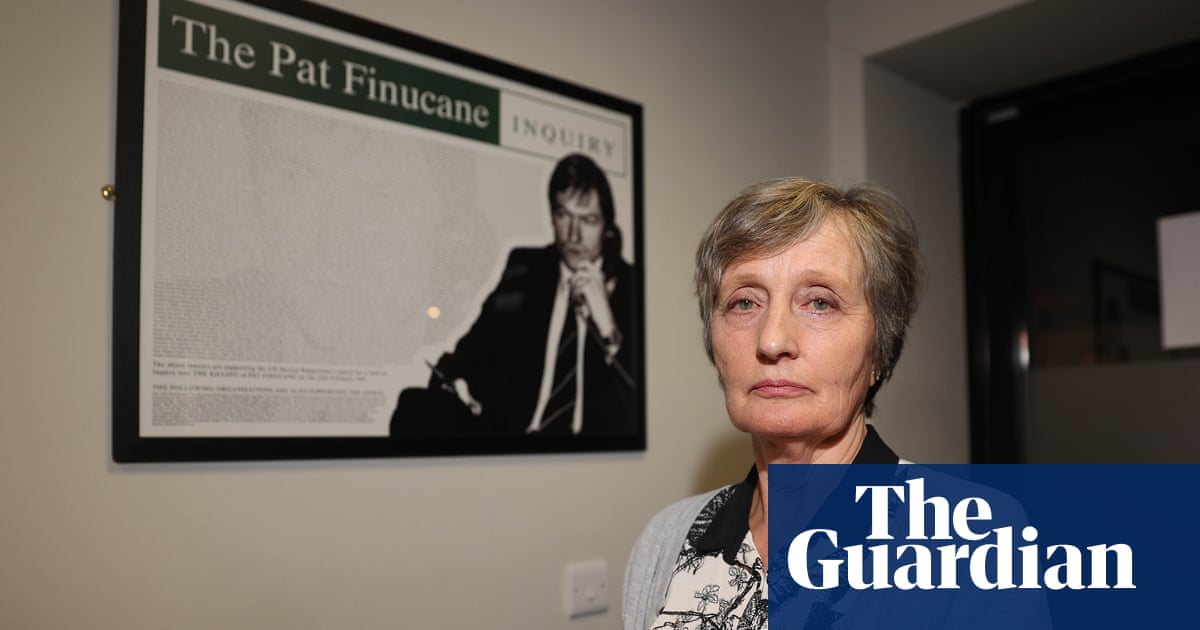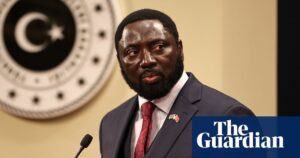
The UK government has ordered an independent public inquiry into the 1989 murder of the Belfast solicitor Pat Finucane, one of the most controversial killings of the Troubles.
The Northern Ireland secretary, Hilary Benn, made the announcement on Wednesday after decades of campaigning by Finucane’s family and supporters, who say the full extent of state complicity in the crime was covered up.
Loyalist gunmen burst into the lawyer’s home on 12 February 1989 and shot him 14 times in front of his wife and children. It later emerged that Brian Nelson, a paramilitary intelligence officer responsible for directing Ulster Defence Association (UDA) attacks, was an agent controlled by the force research unit of the British army.
On Wednesday, Benn said the Labour government took its human rights obligations seriously. “It is very hard for any of us to understand fully the trauma of those who lost loved ones – sons and daughters, spouses and partners, fathers and mothers – and what they have been through,” he told the House of Commons.
Nothing would bring back the dead or erase the pain, Benn continued. “But what we can do is to seek transparency to help provide answers to families, and to work together for a better future for Northern Ireland, which has made so much progress since these terrible events. I hope that this inquiry will, finally, provide the information that the Finucane family has sought for so long.”
In 2004, a judicial review of investigations into the murder recommended a public inquiry, which the then government accepted, but it never happened, said Benn. In 2012, the then prime minister, David Cameron, admitted “shocking levels of collusion” and apologised to the Finucane family but resisted a public inquiry.
Benn said: “The plain fact is that two decades on, the commitment made by the government, first in the agreement with the Irish government and then to this house, to establish an inquiry into the death of Mr Finucane remains unfulfilled.”
The Northern Ireland secretary said the inquiry, operating under the Inquiries Act 2005, should be able to curb costs by building on previous investigations that established state collusion in the murder. The “vast majority” of security forces members served with distinction and honour, Benn said.
The government had considered referring the case to the Independent Commission for Reconciliation and Information Recovery, which is a new mechanism to examine unresolved Troubles-related killing, Benn said. “However, given the unique circumstances of this case, and the solemn commitment made by the government in 2001 and again in 2004, the only appropriate way forward is to establish a public inquiry,” he said.
Finucane’s widow, Geraldine, welcomed the announcement and said it had been a “long road” to this point. “We have only ever been concerned with uncovering the truth. It is this that has kept us going. It is the thing that has been missing, all these years.”
She said the inquiry could be a “watershed” for legacy cases, especially those that involved collusion. “Society as a whole deserves this, after so many years. After 35 years of cover-ups, it is time for truth.”
Dublin welcomed the decision as evidence of the Labour government’s “new approach” to legacy issues. “This is the beginning of a process and it will be important that, as details are confirmed, there is confidence that it can meet the standards and independence thresholds essential to an inquiry of this nature,” the taoiseach, Simon Harris, said. Keir Starmer discussed the case with Harris on a visit to Dublin last weekend.
Michelle O’Neill, the first minister of Northern Ireland, said it was a momentous and long overdue decision. “The Finucanes’ fight has been an inspiration to all families struggling for truth and justice. This day belongs to them. The British government must now work closely with Pat Finucane’s family to ensure the public inquiry meets their needs and uncovers the full truth of this shameful killing,” said O’Neill, who is Sinn Féin’s deputy leader.
Finucane’s son John is the party’s MP for North Belfast, and witnessed the killing. Pat Finucane had defended loyalist and republican paramilitaries but was especially well known for defending IRA members.
His murder ignited a political furore and led to the gradual exposure of the links between the security forces and loyalist paramilitaries, including the activities of Nelson.
Ken Barrett, one of the UDA gunmen who shot Finucane, later fled to Britain, where a BBC Panorama team recorded him claiming a police officer had told him the lawyer was a senior IRA man. “The peelers wanted him whacked,” Barrett was recorded as saying. Nelson and Barrett were both convicted of murder.
Unionist MPs criticised Benn’s announcement, saying it would upset other families denied justice for the murder of their loved ones. “How does he justify to the hundreds of families that there will no such resources placed in seeking out the truth of their family members?” said Sammy Wilson, the Democratic Unionist party MP for East Antrim and former DUP whip.
Jim Allister, the Traditional Unionist Voice MP for North Antrim, said the Finucane family had received a prime ministerial apology, multiple investigations and now a public inquiry, creating an “odious hierarchy of victims”.
John Finucane, a solicitor like his father, said his family had not received preferential treatment. “First of all, the state targeted and set in place, set in motion events that meant my father was murdered in front of all of us as we had our dinner,” he said. “Every single bit of progress we’ve had as a family has had to be fought for. It’s never been handed to us.”
Source: theguardian.com


















